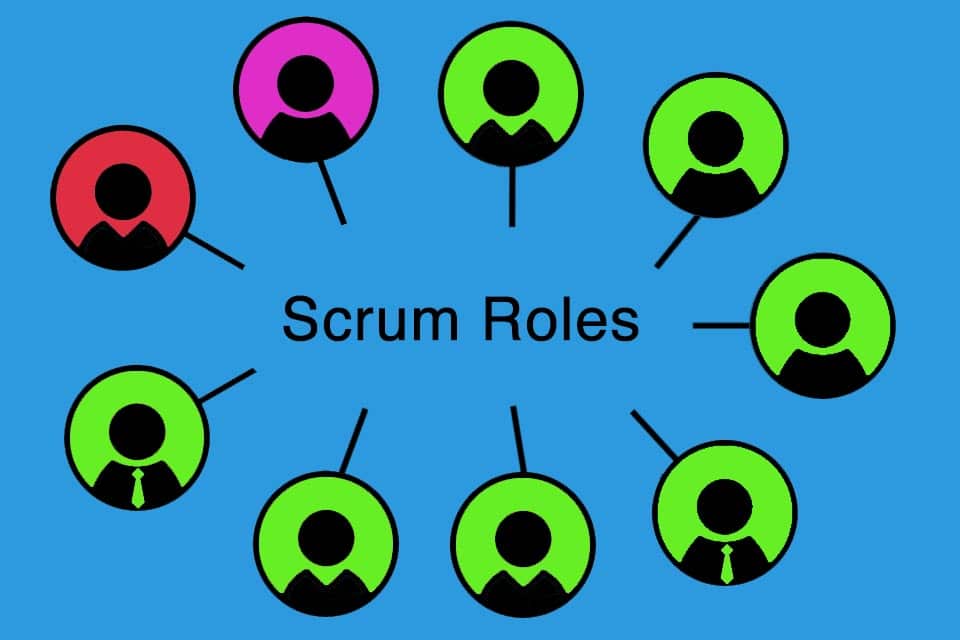Which Scrum Roles exist?
Smartpedia: In Scrum, there are three roles: Scrum Master, Developer and Product Owner. The current Scrum Guide uses the term accountability instead of role.
Scrum Roles – The definition of accountability
Scrum defines three roles:
- Scrum Master,
- Product Owner and
- Developer.
Stop! That is only partially true! The current Scrum Guide does not mention the term role once. Instead of role, the term accountability is used. Accountabilities are divided into three groups: Scrum Master, Product Owner and Developer.
So before we talk about the three Scrum roles, what is the background for this change of term?
Scrum Accountability or Scrum Roles?
What does the Scrum Guide mean when it talks about accountability instead of roles? Accountability is described as responsibility for implementation and responsibility for results. So it is about the understanding of the individual Scrum roles and it is about the commitment of those involved.
The accountability that people take on when they fill Scrum roles with life is described for each individual role. However, not down to the last detail, because Scrum does not try to prescribe everything down to the last little detail; the Scrum Guide calls it Lean Thinking. Thus, “only” a minimum of accountabilities is given, which are necessary for the execution of Scrum.
In terms of the three Scrum roles and their work, the emphasis on accountability will probably make little difference in practice. So you will certainly continue to find job advertisements looking for Scrum Masters, Product Owners or Developers.
Scrum Master
The Scrum Master is accountable for the implementation of Scrum – as defined in the Scrum Guide. As a member of the Scrum team, he or she acts as facilitator, mediator, process facilitator, supporter and coach. Simply put, he/she helps developers and the product owner achieve goals together by facilitating the work of colleagues and fostering collaboration.
Even though the Scrum Master is accountable for the implementation of Scrum and works both towards the Product Owner, the developers and not to forget the organisation, he/she is not superior to the Scrum Team.
An overview of the tasks of the role, the activities as a facilitator, the possible number of teams that can be supported in parallel, the salary and various certifications can be found here: Scrum Master.
We would also like to recommend the following articles:
Product Owner
Another Scrum role is the product owner. He/she represents the ideas of the stakeholders and communicates with them on a regular basis. He or she is accountable for defining the product goal and adding value to the product through the work of the Scrum team. He/she maintains and communicates the product backlog and has the authority to cancel a sprint if necessary.
Even though in practice the product owner is often responsible for releases and release plans, and is often also the technical contact person for the other Scrum roles, he or she is not the superior of the Scrum team. And: according to the Scrum Guide, the role of the Product Owner is filled by a person and not by a group or committee.
An overview of the role’s tasks, other activities in practice, organisational affiliation and various certifications can be found here: Product Owner.
We would also like to recommend the following articles:
Developer
In addition to the Product Owner and the Scrum Master, the Scrum Guide 2020 defines a further accountability or role: the Developer. The previous version of the guide still referred to the role of Development Team.
The Scrum role Developer is not further subdivided in the Scrum Guide. Developers are those in the Scrum team who have committed themselves to creating any aspect of an increment in a Sprint. The interdisciplinary composition of the team members, the willingness to agree on and achieve a sprint goal, the continuous synchronisation of activities, the active elimination of impediments, the consistent discussion and further development of the product and the ability to organise or manage the work in the team itself are only some aspects of the Scrum role Developer.
If neither Scrum Master nor Product Owner are superior to the developers, then logically developers are not subordinate to the other Scrum roles. But they are not superior to them either.
An overview of accountabilities, tasks and skills can be found here: Development Team.
We would also like to recommend the following articles:
- The Black Box of Scrum Team Building
- Reasonable limits for self-responsible teams
- The SWAT Team in Scrum
The continuous exchange of opinions between the Scrum roles
Scrum thrives on the continuous exchange of opinions between the members of the team. Exactly because the self-organisation of the Scrum team enjoys a high value, the exchange among each other is very important. Thus, planning is done together (in Sprint Planning), daily exchanges take place (in Daily Scrum), the results of the work and the outlook on future activities are discussed (in Sprint Review) and the improvement of the cooperation is discussed (in Sprint Retrospective). Even though these so-called events are equally important, the Retrospective has a special significance.
The Retrospective is a meeting to reflect on processes, tools, skills, relationships, challenges and experiences. It is an opportunity to benefit from the feedback of other team members both as a team as a whole and individually. The goals are to improve the collaboration of the Scrum roles and thus to improve processes and content, as well as to define actions, dos and don’ts, based on the insights gained together.
Impulse to discuss:
How important is the Scrum Guide and the emphasis on accountability instead of the use of Scrum roles in the lived corporate practice?
Notes:
Here you will find a German Podcast about: Was bedeutet der neue Scrum Guide für Product Owner? A talk with Tim Klein, Dominique Winter and Alexander Hardt.
If you like the article or would like to discuss it, please feel free to share it in your network. And if you have any comments, please do not hesitate to send us a message.
Here you will find additional information from our t2informatik Blog:




